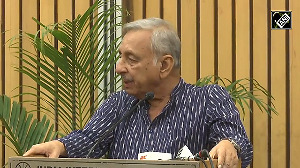After Bt Cotton spreading in the fields of various states in India, will the first genetically modified food crop be mustard? In mid November, it nearly seemed so, but for the moment, its introduction has been stopped in its tracks.
Various NGOs like Greenpeace, Vandana Shiva's Navdanya, Suman Sahai's Gene Campaign and others cried hoarse against it saying that it was fraught with unknown consequences.
They had demanded that the government make public the details of field trials of the genetically modified mustard before granting approval.
The Genetic Engineering Approval Committee of the Union environment ministry has now decided to postpone its decision on allowing genetically modified mustard seeds for commercial cultivation till mid December this year.
Genetic pollution concerns on mustard are acknowledged to be more complex than cotton. It is feared that pollen transfer and weeds would emerge as major problems in time to come for which there would be no ready made solutions.
GEAC chairman A M Gokhale says there is a need to take a hard look at the issue. As mustard is an important food item in India, the possible hazards have to be examined, he said.
Gokhale says he wants to take into account views of NGOs, scientists, farmers and experts on the vexed issue. Gokhale agrees that mustard is a biologically complex crop and could affect other crops.
The GM hybrid mustard variety developed by ProAgro Seeds India Private Limited, the Indian arm of multinational Aventis, with PGS- a Belgian company, claims to give an increase in yield as compared to other varieties grown in the country.
ProAgro says it could give the Indian farmer an additional income of about Rs. 3,500 to 4,500 per hectare.
In India, mustard seeds are used widely in the kitchen. Its oil is used as a cooking medium and its oil cake is a common cattle feed. Leaves of the mustard plant are a delicacy in north India.
Mustard is presently grown in India in around 6.5 million hectares. India grows a fifth of the world's mustard crop.
By 2020, the projected demand for oilseed in India is around 34 million tonnes and of this, 14 million tonnes would be met by mustard alone.
Mustard is grown in Assam, Bihar, Gujarat, Haryana, Himachal Pradesh, Jammu and Kashmir, Madhya Pradesh, Orissa, Punjab, Rajasthan, Uttar Pradesh and West Bengal. India is the second largest producer after China, which has not okayed the GM variety.
Dr Paresh Verma, director of ProAgro says that a wide range of safety studies on the GM mustard had been done and delay in it being okayed would only affect introduction of the yield enhancing technology into India.
ProAgro claims that field trials have been done in as many as 69 locations in the last four years. NGOs are demanding details of the test.
Dr Vandana Shiva, director of the Research Foundation for Science, Technology and Ecology says that the government erred in clearing Bt Cotton and should now not grant approval to GM mustard.
Bt Cotton, she said, had been attacked by pests in all states it was sown contrary to claims of those who produced the genetically modified cotton.
The GEAC had approved commercial cultivation of transgenic Bt Cotton on March 26th this year. Ever since, it has been embroiled in controversy.
Anantha Padmanabhan of Greenpeace India warns that if GM mustard were allowed into India, there would be a high risk of creating herbicide resistant super weeds.
There was also likelihood that GM mustard would contaminate cauliflower and some other vegetables, which would directly affect India's agro exports, as Europe does not allow any GM crop.
Food and trade policy analyst Devinder Sharma says that the GM mustard has been engineered using five foreign genes and there were many unknown risks associated with it as it could risk the existence of other crops.
Both the government and the industry, he said, were not looking for any evidence of harm that GM crops would do on the human system and so were not finding any.
The GM mustard is unique as it is a hybrid. Mustard is a self-pollinating crop and nature does not provide an opportunity for a hybrid to develop.
Says A T Dudhani, president, Society for Citizen Concerns, "Why should we fiddle with nature and go against its natural laws to create something which we are not sure about?"
ProAgro has engineered a hybridisation system by inserting foreign genes in traditional Indian varieties. It claims the hybrid have a yield advantage of around 20 per cent. But health activists are worried about its long-term impacts, most of them unknown.
Asks Ashesh Kumar Tayal, scientific advisor, Greenpeace, "What is not good for foreign countries, should not be good for India too. Why are foreign companies interested in pushing GM crops in India?"
Various NGOs have now in a joint plea to P Shankar, chief vigilance commissioner, said that there must be an investigation into the conduct of the scientific and regulatory agencies concerned with the approval of release of GM crops.
They alleged that multinational corporations with a vested business interest in India were influencing the regulatory agencies to get a verdict in their favour.
The CVC has responded saying it would look into the charge. This has made NGOs see a ray of hope.
"The private industry is spending Rs 60 crore (Rs 600 million) on just testing the nine transgenic crops so that it could get approval. The industry has a vested business interest. Why is the data on the field tests being kept a secret?" asks Sharma.
Sources told rediff.com that the GEAC might now ask both ProAgro and the Indian Council for Agricultural Research to provide additional research inputs before taking a final decision.
The Indian Council for Agricultural Research has not substantiated their claims in increase in yield and obviously will ask ProAgro for most field tests.
The Andra Pradesh Coalition in Defence of Diversity, which is a network of 142 civil society groups, says that permission for the GM mustard should not be granted without a public debate.
Its convenor P V Sateesh wonders why India was in such a hurry to grant permission when countries like Scotland were refusing to let GM crops be cultivated.
There are around 3,000 species of mustard growing mostly in the wild. One major fear is that the GM variety might aggravate the weed problem.
China has adopted some transgenic crops but as the field trials in India are not being made public, the fears generated are real. It has put agricultural biotechnology under a cloud.
But scientists say that ultimately, market economics will rule. If farmers see that there is an economic benefit from GM crops, they will go for it even if it is skirted with controversy.
Farmers in Gujarat were told that fields with Bt Cotton would be burnt, but they went ahead and sowed it, as they wanted better returns.
The fears are real. Is health at risk? Is the traditional Indian mustard going to be affected? The decision in the weeks to come will basically have to figure out whether the higher yield is more important than the risks.
Sarson da saag may leave a bitter taste in many mouths soon. Dr Suman Sahai, President of Gene Campaign says that when a crop is genetically modified, safety tests have to be done with extreme care.
"The field trial done on ProAgro's GM mustard have been inadequate and shoddy and it would be criminal to release the variety," he says.
Gene Campaign has said that results of field tests should be made public so that independent experts could judge it.







 © 2025
© 2025